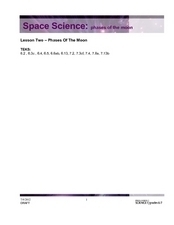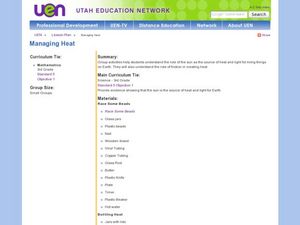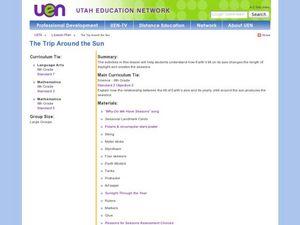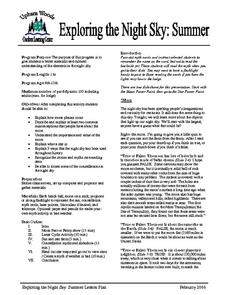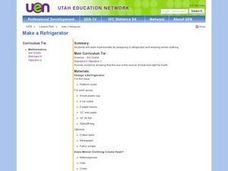Curated OER
Tracking the Sun
Sixth graders plot the a day's movement of the sun across the sky using sun dials fashioned out of clear plastic bowls. They repeat the activity at various times throughout the year and record and compare their results.
Curated OER
Earth and Sun's Distance
Students consider the shape of the Earth's orbit around the Sun. They view the first segment of Science Court video and use Timeliner software to construct a scale of the distance between the Earth and the Sun.
Curated OER
Student Illustrations and Writing About the Sun
Students discuss what they know about the Sun. The teacher distributes work sheets and asks students to draw the Sun and label any parts of it that they know. Students write what they know about the Sun.
Curated OER
Space Science: Phases of the Moon
Looking for a terrific lesson on the phases of the moon that has lots of good worksheets? With two excellent websites are embedded in the plan, the activity is sure to spark some interest in your astronomy unit. Some common...
Columbus City Schools
Totally Tides
Surf's up, big kahunas! How do surfers know when the big waves will appear? They use science! Over the course of five days, dive in to the inner workings of tidal waves and learn to predict sea levels with the moon as your guide.
NASA
Evaluating a Lunar Eclipse
Do all lunar eclipses look the same? Find out in an activity where astronomers use the Danjon Scale of Lunar Eclipse Brightness to describe the color and brightness of the moon during an eclipse. Explorers make three observations using...
Curated OER
Managing Heat
Third graders perform various experiments to show the flow of energy that causes heat. In this heat lesson, 3rd graders understand how heat is transferred or trapped. Students use the scientific method and critical thinking skills to...
Curated OER
Tilted Earth
What causes Earth's seasons? Find out through a series of anticipatory questions, an easy yet powerful activity representing the sun-Earth system, a diagram to label, and follow-up questions. Dispel the misconceptions about Earth being...
Curated OER
The Trip Around the Sun
Sixth graders investigate the relationship between the tilt of the Earth's axis and the seasons. For this earth science lesson, 6th graders sing the song "Why Do We Have Seasons" and use simulate the Earth's tilt by using their bodies.
Curated OER
Does the Distance Between the Earth and Sun Cause the seasons?
Students reflect upon the concepts of seasons. The concepts are taught using a variety of different teaching approaches. A activities lead to a reflection that will help students to make a cognitive transfer of information form...
PHET
Planetary Magnetism
What do magnetic fields look like? The best way to learn about magnetic fields is to try identifying them for yourself. Scholars will understand the importance of magnetic fields after completing this experiment. The extension activities...
Curated OER
Exploring the Night Sky: Summer
Students explain how moon phases occur. They describe and explain at least two common misconceptions that people have about the moon. Students explain what a star is. They explain 3 ways that the night sky has been used throughout history.
Curated OER
A New Slant On The Seasons
Students identify how the tilt and position of the Earth causes the seasons. After a discussion of the seasons and when they begin. Using themselves as the objects in the universe, they role play how the rotational movement of the...
Curated OER
Make a Refrigerator
Third graders explore the concept of heat transfer as experienced in wearing winter clothing and analyzing the refrigerator.
Curated OER
The Four Seasons - Earth's Axis
Pupils discover that it is the tilt of the earth's axis that results in the seasons. They clarify common misconceptions about the earth's orbit around the sun.
Curated OER
Catching Some Rays
Sixth graders explore the tilt of Earth's axis. In this Earth instructional activity, 6th graders read a Greek mythology story explaining why there are seasons. Students build a sun-ray gathering tool from styrofoam, glue,...
Curated OER
Earth's Seasons
Sixth graders review the relationship between the Sun and the Earth. In groups, they use a globe and flashlights to show the shadows on the Earth during the different seasons. To end the lesson, they write in their journals about their...
Curated OER
Friction
Students are introduced to the concept of friction. Using that information, they discover ways in which friction can be useful. They participate in different activities to see fricition in action. They complete a grid worksheet and...
Curated OER
Astrology: Fact Or Fiction?
Students investigate the concept of astrology and how it evolved from history. They use the Zodiac in order to find the location of constellations in the night sky. The differences between astrology and astronomy are compared and any...
Curated OER
Is it Really Winter in Australia? It is June!
The purpose of this activity is to determine how the location of a place on the Earth (hemisphere) determines what season that place is experiencing relative to the Sun's rays. Day one the young scholars will be introduced to the terms...
Curated OER
Are You Sure it is not the Distance?
Students examine how the changing distance between the Earth and the sun causes the seasons. They watch a Science Court video, and answer discussion questions using Science Court Seasons software.
Curated OER
It's Hot
Third graders examine the effect of sunlight on the earth. Individually, they pick an article of clothing out of a bag and sort themselves based on the color of the shirt and whether it should be worn on a cold or a hot day. To end the...
California Academy of Science
Kinesthetic Astronomy: Earth's Rotation
After completing the activity, "Kinesthetic Astronomy: The Meaning of a Year," zoom in on Earth's rotation using the same simulation setup and this outline. Each class member dons a map of the Western Hemisphere and plays the part of...
Curated OER
Earth Moon Scaling
A wonderful lesson incorporating math and physics skills along with specific details about the planetary bodies. The cross-curricular approach makes for a valid activity to challenge multiple ages and abilities. Your class could work in...





